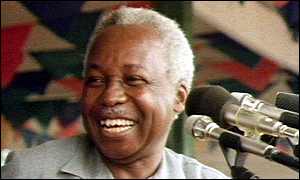







































|

|

|

|

|

|

|

|

|

|

|

|

|

|

|

|

|

|

|

|

|

|

|

|

|

|

|

|

|

|

|

|

|

|

|

|

|

|

|
|
|
|

|
|
|
MWALIMU JULIUS NYERERE |
|

|
|
|
Julius Kambarage Nyerere became the first President of independent Tanganyika in 1962, one year after steering the country to independence from the British. In 1964, just two years into his Presidency, he brokered a landmark agreement with leaders of his island neighbours Zanzibar to join him in forming a unified government. At the time of the proposed merger, both Tanganyika and Zanzibar were under threats of internal coups and the merger was meant to provide a united force to counter the uprisings. The result was the creation of the Republic of Tanzania. President Nyerere, eventhough very rarely mentioned alongside the other major names in the struggle against colonialism, is without a doubt among the key players in African politics. Known affectionately in African circles simply as Mwalimu, he is right there among Africa's finest leaders, the likes of Nelson Mandela, Kwame Nkrumah or even his East African counterpart Jomo Kenyatta. Mwalimu is Swahili for Teacher. But unlike the aforementioned leaders who were best known for their struggles against white supremacy, Nyerere's legend came from his true African lifestyle, which led him to shun materialism and individualism; mainstays of the capitalist West. Nyerere was unique in that he actually lived the socialistic lifestyle unlike other African leaders who preached socialism to their citizens but lived capitalistic lifestyles. He is for instance remembered fondly as one of the few African leaders who didnt run around in expensive Mercedes Benz motorcades. As a matter of fact, he is reported to have loathed such practises, and even popularized the term Wabenzi in Tanzania. The term Wabenzi borrows from the legendary German luxury car Mercedes Benz. It is a common stereotype in Africa that the first thing we do when we run into some money is go after the latest Mercedes Benz models in the market. This is often at the expense of other pressing and more beneficial needs. In the same context, the term was used to refer to the greed of most African leaders, who used their countries' resources to buy expensive Mercedes Benz models while the majority of their citizens wallowed in poverty. Nyerere feared that under capitalism, Tanzania, would become a country of a 1000 Wabenzis and 10 million paupers. You will also remember that under Nyerere, Tanzania used the local language Swahili as the language of instruction unlike other formerly colonized African countries which ended up adopting the languages of their colonizers. This is yet another powerful example of how Nyerere, the true African leader, fought tooth-and-nail to preserve everything African from the harmful effects of colonialism. Its important to note here that Nyerere opposed Capitalism primarily on the basis that it did not conform to the African way of life which centered on communal living, and not on its merits persee as has been characterized by his opponents in the West. I feel inclined to point this out because in opposing capitalism, Nyerere was wrongly depicted by a section of the Western media as being quite a naive or even simplistic African leader. The fact of the matter however is that he simply believed, and I concurr fully with him, that African problems could best be confronted using African initiatives. It was for this reason that he came up with the Ujamaa system, a socialist system comprising of small farmer-based communities spread throughout the country. The idea behind Ujamaa was to create a self-sustaining class-less society in Tanzania where everybody enjoyed equal rights and shared equitably in the available resources. Nyerere's 1967 Declaration read in part, The objective of socialism in the United Republic of Tanzania is to build a society in which all members have equal rights and equal opportunities; in which all can live in peace with their neighbours without suffering or imposing injustice, being exploited, or exploiting; and in which all have a gradually increasing basic level of material welfare before any individual lives in luxury. Nyerere who died in 1999, will be remembered most as the ideal African father-figure, always ready to listen and help others solve their problems. His great courtesy and hospitality, the obvious results of his deep African cultural upbringing, acted like a magnet to his fellow Africans in problems, constantly running to him for assistance. Citizens of Zimbabwe(formerly Rhodesia) and South Africa would probably be the best witnesses of this because if there was anyone they could count on for help against their imperialist regimes, it was Nyerere. Nyerere not only provided refuge to his neighbours in Africa, but also extended his arms all across the atlantic to provide a safe haven to his African-American brothers fleeing reprisals by Edgar Hoover's FBI during the turbulent 1960's. Its strange that up until today, a few years after his death, he is almost never mentioned in many African-American circles or even given credit for the important role he played during the Civil Rights Movement in the U.S. Nyerere was born on April 13th 1922 in Butiama in the North- Western part of Tanganyika. Butiama lies along the Eastern shores of Lake Victoria. Reports indicate that his father was a Chief of the small Zanaki tribe. The young Nyerere obtained his primary school education in Musoma, some 26 miles from his home. After successful completion of his primary school education, he joined the Tabora Government Secondary School, where he got his teaching from Roman Catholic teachers. His secondary school teachers must have made quite an impression on the young Nyerere because not only did he become a staunch Catholic, but also chose to train as a teacher when he later joined the prestigious Makerere University in Kampala, Uganda. After obtaining his teaching cerificate from Makerere, he came back to Tanganyika where he taught for a few years, before securing a government scholarship to pursue an M.A. in History and Political Economy at the University of Edinburgh. This made him the first Tanzanian to study at a British University abroad. It was during his studies at Edinburgh that Nyerere became politically active. On his return to Tanganyika, Nyerere became more of a politician than a teacher and in 1954, established a political party TANU(The Tanganyika African National Union), with himself as President. In 1958, he became a member of the Legislative Council(LEGCO) and in 1961, when Tanganyika was granted internal self-government by the British, he ascended to the position of Prime Minister. Tanganyika gained full independence in December 1961, paving the way for Nyerere to become President in 1962. In 1964, Nyerere convinced leaders of the neighbouring Island of Zanzibar to join him in forming a unified government. The result was the creation of the Republic of Tanzania. The highlight of Nyerere's Presidency came in 1967 when he introduced the socialist Ujamaa system. Needless to say, this move alienated him from the U.S, the British and other Western Capitalist countries while at the same time endearing him to China and the then Soviet Union. Like any other revolutionary idea, Ujamaa faced a lot of resistance, both internal and external. The biggest external pressure came from none other than the U.S., who in fact registered their displeasure by cutting off the much needed aid to Tanzania. There was also a lot of internal resistance to Ujamaa by a large section of Tanzanian citizens who had considered independence the final barrier to self-enrichment. In addition to that there was the peer-pressure factor that existed when they looked at their capitalist neighbours in Kenya and Uganda. Ujamaa was a system that primarily depended on self-sacrifice, and if the will to do so was lacking amongst many Tanzanians, there was no way it could succeed. Nyerere's Ujamaa system failed and ten years later, the dignified Mwalimu was candid enough to allude to this fact. Unlike many politicians of our time, he did not run away from criticism nor shy away from the prospect of being touted the sponsor of a failed system. As a matter of fact thats exactly what his opponents in the Western media did. They called Nyerere the man who "failed" Tanzania. In 1985, Nyerere stepped down as Tanzania's President, but remained the head of the CCM(Chama Cha Mapinduzi). He gradually withdrew from active politics, retiring to his farm in Butiama. Nyerere died of Leukemia at a London Hospital on October 14th 1999, ending a much-appreciated 77 years of dedicated service to Mother Africa. The life of this great African Statesman opens up some serious questions that we Africans have yet to address. For example, it became commonplace to hear some African academics jump on the Western media bandwagon and characterize Mwalimu as a failed leader. But did Nyerere really fail for seeking African solutions to African problems? I mean isnt that the whole reason why the African continent finds itself in the terrible mess it currently is in? After all those loans Africa has received from the IMF and World Bank in an effort to "modernize" itself, the continent finds itself more impoverished than it was originally, trying to pay off those high interest loans. There is absolutely no question that the IMF and World Bank policies have impoverished the world and if you are seeking further proof, just look up their next meeting venue and consider the trememndous worldwide protests they generate. In addition to that, some of the African countries that were considered by the West to be on the road to industrialization, look good on paper but in actuality are far worse off than Tanzania in terms of basic provisions like food, shelter and literacy. So while they might have better roads and infrastructure, a large section of their populace is impoverished, even to the point of hunger and starvation. So while Ujamaa as a system did not achieve its intended objective in Tanzania, to me it was an idea in the right direction because its primary emphasis was on self-sustenance(especially in terms of food). They way we have it in Africa nowadays is the complete opposite because we seem to be very interested in addressing all other issues but the important ones(food and shelter). Africa is in such a mess because we lack other leaders of Mwalimu's calibre. |
|
|
Return to the Home Page |
|
|
Copyright©AfricanTribute.com Inc., 2002 |
|
|
|

|
|
|
|